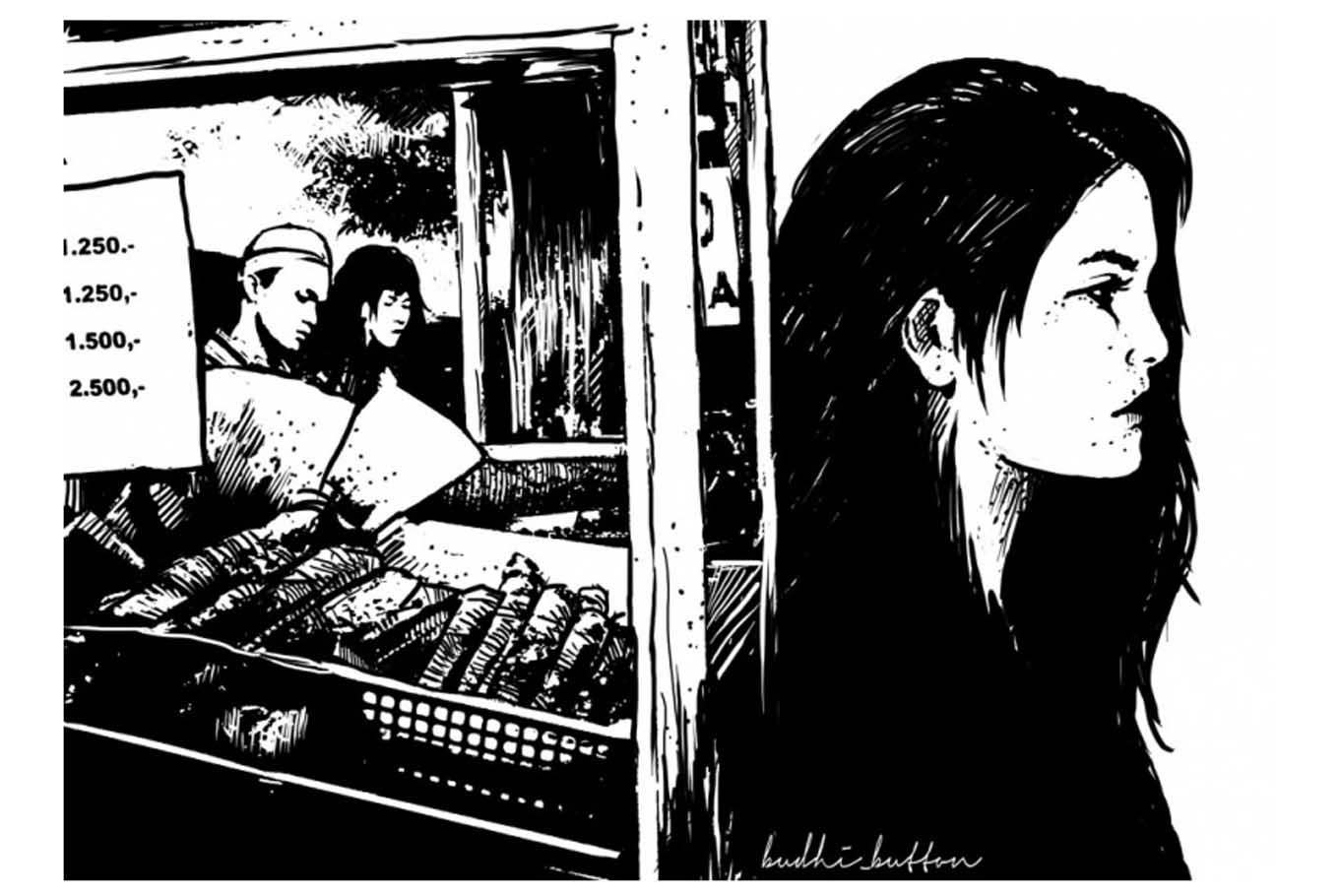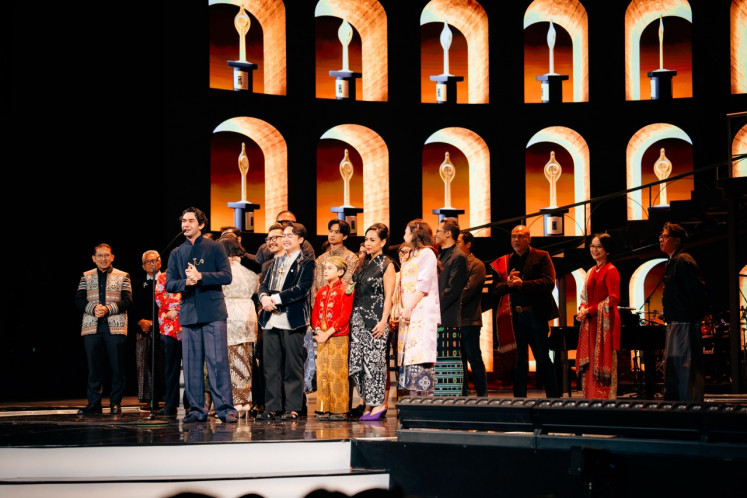Popular Reads
Top Results
Can't find what you're looking for?
View all search resultsPopular Reads
Top Results
Can't find what you're looking for?
View all search resultsShort Story: Because You Remember
So it comes to this. You decide to die today.
Change text size
Gift Premium Articles
to Anyone
Dunia ini pang mantaganta (This world where we dwell)
Ibarat Noraka pakkasiatta (Feels like hell)
Hidup tersiksa ri tomo butta (Living in dread)
Terombang-ambing ri jene matta (Tossed in tears)*
You can’t recall who wrote it. The verse was in the language of your home. Makassar. The world has become an increasingly difficult place to live in.
So it comes to this. You decide to die today.
When the door opens, you shout at the Ibu who steps in. This is express lift. Why did you come in? The Ibu retorts quickly. You gila. In a hurry to die, are you?
You are ready to die.
But in the meantime, you are hurrying to catch the bus.
How can the Ibu understand?
These are new faces. The old neighbors at your block are mostly gone. Some moved abroad, the lucky ones upgraded for better lives, some others get sent off to homes in the countryside. The cost of dying is cheaper somewhere else beyond the city. Gone are the days when someone asks how you are, and you would say, never been better.
The sun meets your eyes as you walk toward the bus stop. The bus arrives just as you reach there.
Your body is still agile enough to heave the weight of solitude and sadness in you.
A young chap gives up his seat for you. You blink your thank you to him without a word. He thinks you are old. You think: Am I?
As the bus melds into the morning crawl, you look out to see men who arrive in life, their faces stained with light and life, comfortably ensconced in their fast cars. Their faces tell you a thousand things, of a past you have too.
You are fast forgetting the faces.
Your mind is falling behind. Some days so far behind that you can’t remember much. Other days, you remember a thing or two. Most days, you struggle.
Your mind has become a darkness so dark that it absorbs every living sound and memory that has been a part of you before.
As the bus makes a right turn, the woman beside you taps your shoulder. Pak, you dropped this. You suddenly remember the brown bag, where you are heading and when you are going to die.
Where you are heading has become a familiar place to you when you remember. The only thing in life you seem to remember as the rest of things become a fog. It is a peaceful, leafy enclave you look forward to visiting on the days when you remember things. So, there you are, drinking in the quiet around you and lifting your feet carefully around to meet the beautiful woman buried in the ground. You reach out to replace the wilted flowers with fresh ones you bring along. You can’t remember the last time you put flowers there, just as you can’t remember those days that you want to kill yourself like what you plan to do today. From the brown bag, you take out some cakwe that connects the two of you together. One that you buy from a street warung, and you know it is not as tasty as yours. You can’t bear to make it yourself anymore.
How can someone with steady hands who makes good cakwe die so young?
Nearly 40 years ago, you convinced her to marry you and move to Jakarta. She had wanted to keep to her simple way of life by the sea. But you promised a life of comfort in the city: far superior than anything else, you said. Soon after arriving in Jakarta, you realized it wasn’t easy to make a living there, but the promise of better days to come teased you to stay on.
What we can’t see, gives us hopes, you said to her. Her eyes blinked with an understanding that uncertainty gives a dint of hope that is more powerful than what you can see on the horizon.
A decade later, you and your wife managed a stall selling cakwe, at a corner of Senopati. Back then, the street had yet to be gentrified with the numerous hip cafes and classy restaurants you see today. Your business was good then. People loved the crispiness of your cakwe on the edge of their tongues. But all good things don’t last.
One day, your wife fainted at the stall, the good life slipping away from your hands.
Soon, you were shuttling between the stall and the hospital. The greasiness of the fried fritters on your skin sat uncomfortably with the sterile smell of the hospital. But it announced your presence to the nurses who soon got used to your smell. They reciprocated your kind gesture of cakwe with quiet encouragement that she would get well soon.
You would sit there, watching her wasted form, and believe that life would return to her sunken, expressionless face.
The cakwe is waiting for you, you whispered. So are the people. They can’t wait for your fried fritters. They teased me and said yours are better than mine. So come back soon.
The people are sweet, you continued despite the stony silence from your wife. They have been buying the cakwe in bags so that I could finish up early at the stall, and come to the hospital. A tear dropped from your face. Then more. It tasted salty at the edge of your mouth. You suddenly had an idea. Let’s try to sell cakwe with different flavors — sweet, sour, salty and all. It will be our way to show our thanks to the loyal customers, and it will be good for our business. But your conviction this time did not work on her.
Suddenly you remember. Not the name. But that the verse was by a poet who died young, like the woman you love.
With her sudden passing, you started out wanting to forget all the unhappy things. You can’t remember the happy things now either. Try as you might, you can’t preserve in your memory what you feel, in all its detail.
Slowly, you can’t quite remember things at all, much like footfalls echoing in the head.
But today you remember her.
It is a good day for you.
The sun soaks the ground. You feel her presence, somehow. You stare on the ground, and imagine that she would rise to embrace you. She remains a clod of earth, buried in the bustle of life around you.
You remember her words today. And how you wish to die today because you remember.
The weather shines kindly on good people. You are a good person. It will be sunny for us. She assured you, seeing your anxiety. The sky was blue for once on that first day when your stall opened for business, bereft of signs it was the rainy season.
Then you had hoped that it could stay sunny, always.
It was only in the evening when you both left, tired but happy, that the downpour came and washed away all the goodness there was.
*Pantun was penned by Ang Ban Tjiong (1910-1938)
***
Jonathan Tan Ghee Tiong is the head of culture and information division at the ASEAN Secretariat. He is currently distracting himself from completing his novel by working on short stories.
___________________________________________
We are looking for contemporary fiction between 1,500 and 2,000 words by established and new authors. Stories must be original and previously unpublished in English.
The email for submitting stories is: shortstory@thejakartapost.com
We are no longer accepting short story submissions for both online and print editions. New submissions to shortstory@thejakartapost.com will not be published.











